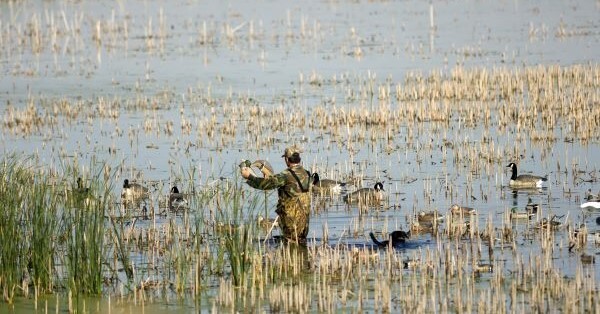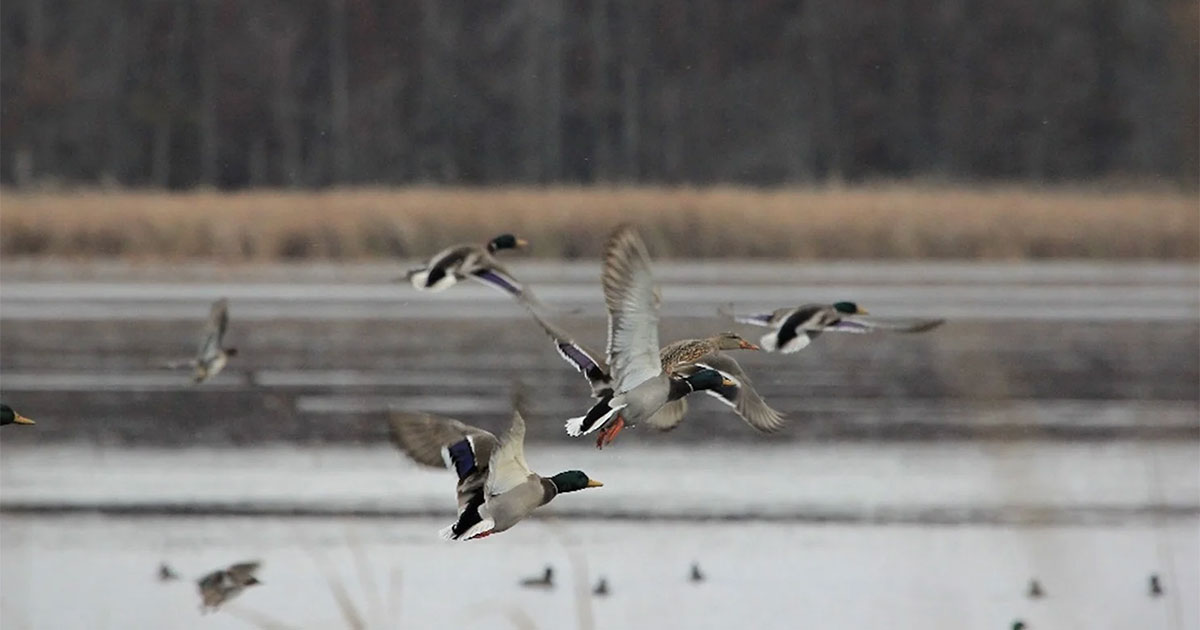- Details
MDNR report

Michigan DNR officials are reminding waterfowl hunters to take precautions to protect themselves and domestic animals from highly pathogenic avian influenza, commonly known as bird flu. This fall, the Michigan Department of Agriculture and Rural Development has reported increasing outbreaks of HPAI in commercial and backyard poultry flocks, including new detections in counties with popular waterfowl hunting destinations.
The DNR reports more HPAI detections in 2025 than were found in 2024; 130 wild birds have tested positive for HPAI in Michigan, with most detections in Canada geese, bald eagles and red-tailed hawks. Wildlife detections and pending cases are posted on the DNR’s HPAI webpage.
The disease has been found in every Michigan watershed, indicating that it has occurred throughout the state.
HPAI has been detected in surrounding states and other parts of the U.S. as well. Hunters traveling out of state are advised to follow all health and safety precautions regardless of where they are hunting. Visit the USDA H5N1 Influenza webpage for more information about national detections and response.
Michigan’s earliest waterfowl season opened Sept. 1 and the final season closes Feb. 15. Learn more at Michigan.gov/Waterfowl.
“Make sure to take appropriate precautions when field dressing wild birds. In order to kill the virus, use a food thermometer to ensure that meat is cooked to an internal temperature of 165 degrees Fahrenheit,” said Dr. Scott Larsen, DNR wildlife veterinarian. “It’s also important to properly clean and disinfect gear and equipment before coming into contact with domestic birds.”
HPAI is a highly contagious respiratory disease that causes sickness and sometimes death in wild birds and mammals. HPAI infections can occur at any time of the year, but upticks are expected during spring and fall waterfowl migrations. Wild birds can carry HPAI without appearing sick.
Anyone who observes a die-off of six or more wild birds should report it through the DNR Eyes in the Field online tool or a local DNR field office.
Precautions for waterfowl hunters
The risk of HPAI infecting people is low, but the virus can spread through direct contact with infected animals or material. Hunters should always take precautions when handling wild birds to avoid contracting or spreading bird flu:
For more information about HPAI and human health, visit the Michigan Department of Health and Human Services webpage for Communicable Disease Information and Resources or the Centers for Disease Control and Prevention webpage for Avian Flu
- Details
IDNR Report

From breakfast in the blind to celebrating a limit with your fellow hunters, waterfowl hunting is one of the most social and fun-filled outdoor activities. But do you have your ducks in a row for the season?
DNR has a new license system, the Activity Hub. Getting your account set up early and making sure you have the required hunting licenses, stamps, and HIP registration number will give you plenty of room to troubleshoot, ask for help, or visit a retailer if needed.
Also, here’s a link that provides a lot of the details for the season:
To log in:
Go to GoOutdoorsIN.com and click the Login button. You’ll be directed to Access Indiana, where you'll log in or create an account.
Once logged in, you'll be returned to the Hub to verify your personal info, purchase licenses, and apply for reserved hunts.
Need help or have questions? Call: 317-232-4200 or 877-463-6367 or email INHuntFish@dnr.IN.gov.
For a full list of waterfowl hunting dates, regulations, and an outline of which stamps each age group needs, take a gander at the Indiana Hunting and Trapping Guide.
Also, here’s a link to the IDNR web page that provides a lot of the details for the season:
- Details
MDNR Report
The Michigan DNR reminds waterfowl hunters to protect themselves and domestic animals amid ongoing cases of highly pathogenic avian influenza. Commonly known as “bird flu,” HPAI is a highly contagious respiratory disease that causes sickness and sometimes death in birds and mammals. Wild birds can carry HPAI without appearing sick.
HPAI has been found in North American waterfowl since 2021. This year, the DNR has detected cases of HPAI primarily in Canada geese, bald eagles and red-tailed hawks. A list of detections are posted on the DNR’s HPAI webpage.
Cases can be found at any time of the year, but upticks are expected during spring and fall waterfowl migrations.
“Although it has been seen in Michigan for a few years now, the patterns of infection differ each year, and we continue to monitor this disease in Michigan’s wildlife,” said Dr. Scott Larsen, DNR wildlife veterinarian. “We count on our hunters, birdwatchers and other Michiganders to let us know what they’re seeing, and the online DNR Eyes in the Field reporting tool is a great way for folks to notify us of events with multiple sick or dead birds.”
- Details
MDNR Report
The Michigan DNR has recently sampled dead wild birds suspected to be positive for highly pathogenic avian influenza at multiple locations across Lower Michigan. The DNR’s ongoing disease surveillance indicates that HPAI is widespread in wild bird populations throughout the state.
HPAI is a highly contagious respiratory disease that causes sickness and sometimes death in birds and mammals. The virus spreads through fecal droppings or nasal discharge of an infected bird, which contaminates the environment.
So far this year, more than 300 dead wild birds have been discovered in five counties.
DNR staffers collected 77 dead Canada geese and one dead mallard from the Fennville Farm Unit at Allegan State Game Area in Allegan County. More than 80 dead Canada geese were reported along the Shiawassee River near Owosso in Shiawassee County. About 25 dead Canada geese were reported at Williamston Lakes in Ingham County, and another 20 dead birds were reported along the Grand River in Grand Ledge in Eaton County. About 100 dead birds were reported in Washtenaw County.
Samples collected from the Allegan State Game Area, Shiawassee River, Williamston Lakes and Washtenaw County sites were sent to the Michigan State University Veterinary Diagnostics Laboratory in East Lansing for testing. Preliminary results indicate avian influenza is suspected.
- Details
MDNR Report
The Michigan DNR reminds late-season goose hunters to protect themselves and domestic animals amid ongoing cases of highly pathogenic avian influenza. Commonly known as “bird flu,” HPAI is a highly contagious respiratory disease that causes sickness and sometimes death in birds and mammals. Since December 2024, there has been an uptick in HPAI wild bird mortality, primarily in Canada geese, trumpeter swans and scavenging birds.
“While waterfowl hunters are much more likely to encounter wild birds, it’s important for all Michiganders to understand the health risks that bird flu can pose to wildlife, humans and domestic animals,” said Mitch Marcus, DNR Wildlife Health supervisor. “The virus has been identified in Michigan’s wild birds and mammals, as well as domestic cats, dairy cattle and poultry.”




